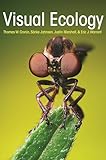Visual ecology / Thomas W. Cronin, Sönke Johnsen, Justin Marshall, Eric J. Warrant
Cronin, Thomas W | Johnsen, Sönke [autor/a] | Marshall, N. Justin [autor/a] | Warrant, Eric J [autor/a].
Tipo de material: Libro
impreso(a)
y electrónico
Editor: Princeton: Princeton university Press, c2014Descripción: xx, 405 páginas : fotografías, ilustraciones ; 26 centímetros.ISBN: 0691151849; 9780691151847.Tema(s): Visión | Ecología animal
Libro
impreso(a)
y electrónico
Editor: Princeton: Princeton university Press, c2014Descripción: xx, 405 páginas : fotografías, ilustraciones ; 26 centímetros.ISBN: 0691151849; 9780691151847.Tema(s): Visión | Ecología animal| Tipo de ítem | Biblioteca actual | Colección | Signatura | Estado | Fecha de vencimiento | Código de barras |
|---|---|---|---|---|---|---|
| Libros |
Biblioteca Chetumal
Texto en configuración de biblioteca Chetumal |
Acervo General | 573.88 V5 | Disponible | ECO030008521 | |
| Libros | Biblioteca Electrónica Recursos en línea (RE) | Acervo General | Recurso digital | ECO400577465745 |
Incluye bibliografía: páginas 354-382 e Índice: páginas 382-399
Glosario: páginas 344-354
List of Illustrations.. Preface.. 1 Introduction.. 2 Light and the Optical Environment.. 3 Visual Pigments and Photoreceptors.. 4 The Optical Building Blocks of Eyes.. 5 The Eye Designs of the Animal Kingdom.. 6 Spatial Vision.. 7 Color Vision.. 8 Polarization Vision.. 9 Vision in Attenuating Media.. 10 Motion Vision and Eye Movements.. 11 Vision in Dim Light.. 12 Visual Orientation and Navigation.. 13 Signals and Camouflage.. Glossary.. References.. General Index.. Index of Names
Disponible para usuarios de ECOSUR con su clave de acceso
Visual ecology is the study of how animals use visual systems to meet their ecological needs, how these systems have evolved, and how they are specialized for particular visual tasks. Visual Ecology provides the first up-to-date synthesis of the field to appear in more than three decades. Featuring some 225 illustrations, including more than 140 in color, spread throughout the text, this comprehensive and accessible book begins by discussing the basic properties of light and the optical environment. It then looks at how photoreceptors intercept light and convert it to usable biological signals, how the pigments and cells of vision vary among animals, and how the properties of these components affect a given receptor's sensitivity to light. The book goes on to examine how eyes and photoreceptors become specialized for an array of visual tasks, such as navigation, evading prey, mate choice, and communication. A timely and much-needed resource for students and researchers alike, Visual Ecology also includes a glossary and a wealth of examples drawn from the full diversity of visual systems. The most up-to-date overview of visual ecology available Features some 225 illustrations, including more than 140 in color, spread throughout the text Guides readers from the basic physics of light to the role of visual systems in animal behavior Includes a glossary and a wealth of real-world examples Some images inside the book are unavailable due to digital copyright restrictions. eng
Disponible en línea
Disponible en formato PDF
Subscripción a EBSCOhost Julio del 2016
